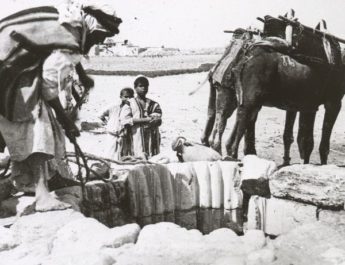Isaiah 7:10-16
Fourth Sunday of Advent A
10 AgainA the LordB spokeC to Ahaz,D saying,
A “again” = yasaph. This is to add, increase, continue, exceed.
B “Lord” = YHVH. From havah (to be, become) or hayah (to come to pass, become, be). This is the name of the God of Israel, the self-existent and eternal one, the tetragrammaton. This pronunciation has been lost to time so “Lord” is generally used in its place.
C “spoke” = dabar. This is generally to speak, answer, declare, or command. It might mean to arrange and so to speak in a figurative sense as arranging words.
D “Ahaz” = Achaz. From achaz (to grasp, catch, seize, take and hold in possession; to be afraid or hold back). This is Ahaz, meaning “he has grasped” or “possessor.”
11 “AskE a signF of the LordG your God;H
E “ask” = shaal. This is to ask, inquire, beg, borrow, desire, request. It can also mean to demand.
F “sign” = ot. From avah (to mark, sign, point out); OR from uth (to agree). This is a sign in a literal or figurative sense. It could be a flag or monument. It could be evidence or a mark. It could also be an omen or a miracle.
G “Lord” = YHVH. Related to “Lord” in v10. It is the same word as “Lord” in v10, but with a different vowel pointing. It has the same meaning. See note B above.
H “God” = Elohim.
let it be deepI as SheolJ or highK as heaven.”L
12 But Ahaz said, “I will not ask, and I will not put the LordM to the test.”N
I “deep” = amoq. 9x in OT. This is to be deep in a literal or figurative sense. It can also mean profound.
J “Sheol” = Sheol. Related to “ask” in v11. Perhaps from shaal (see note E above). This is the place where the dead go, the grace, the underworld.
K “high” = gabahh. This is to soar or be lofty. So, this is to be high or lift up literally. Figuratively it means to be exalted or proud.
L “heaven” = maal. From alah (to go up, ascend, be high, be a priority; to arise in a literal or figurative sense). This is the upper part, forward, high above, upwards, greater, heaven, or exceedingly.
M “Lord” = YHVH. Same as “Lord” in v11. See note G above.
N “put…to the test” = nasah. This is to test, prove, try, tempt, or attempt.
13 Then Isaiah said, “HearO then,P O houseQ of David!R
O “hear” = shama. This is to hear, call, consent, or consider. It implies listening intelligently, giving attention, and, because of these two factors, obedience and action are often implied.
P “then” = na. This particle is used for requests or for urging. It can be we pray, now, I ask you, oh. This is the same “na” in “hosanna.”
Q “house” = bayit. Probably from banah (to build, make, set up, obtain children; to build literally or figuratively). This is house, court, family, palace, temple.
R “David” = David. From the same as dod (beloved, love, uncle); the root may mean to boil, which is used figuratively to describe love. So, this implies someone you love such as a friend, a lover, or a close family member like an uncle. David’s name likely means something like “beloved one.”
Is it too littleS for you to wearyT mortalsU that you weary my God also?
S “little” = me’at. From ma’at (being or becoming small, decrease, diminish, pare off). This is a little or few, lightly little while, very small matter.
T “weary” = laah. 19x in OT. This is to be weary or exhausted, parched, faint, or tired. It could also mean to be impatient, or have a hard time. Figuratively, this could refer to being grieved or disgusted. This is the root verb that Leah comes from.
U “mortals” = ish. Perhaps from enosh (human, humankind, mortal); from anash (to be weak, sick, or frail). This is man, husband, another, or humankind.
14 ThereforeV the LordW himself will giveX you a sign.
V “therefore” = ken. Perhaps from kun (properly, in a perpendicular position; literally, to establish, fix, fasten, prepare; figuratively, it is certainty, to be firm, faithfulness, render sure or prosperous). This is to set upright. Generally used figuratively to mean thus, so, afterwards, rightly so.
W “Lord” = Adonai. From adon (lord, master, owner); root means to rule or be sovereign. This is the actual Hebrew word for Lord used (in a different form) of humans and (in the present form) of God. It means someone who is in control.
X “give” = natan. This is to give, put, set, offer. It is to give literally or figuratively.
Look,Y the young womanZ is with childAA
Y “look” = hinneh. From hen (lo! Behold! If, though; an expression of surprise). This is to draw attention, show suddenness or surprise, or to emphasize the importance of the coming statement. See! Lo! Behold!
Z “young woman” = almah. 7x in OT– this is the same word used in Isaiah 7:14 to refer to the “young woman” who is with child and shall name her son Immanuel. From elem (youth, lad, stripling; something that remains out of view); perhaps from alam (to hide, conceal, a dissembler; to conceal in a literal or figurative sense). This is a young woman or girl. It can be a maid as one who is veiled. By extension, this can mean virgin since a girl/young woman was presumed to be a virgin.
AA “is with child” = harah. 16x in OT. From harah (to conceive or be pregnant –literal or figurative). This is conceive or pregnant.
and shall bearBB a sonCC and shall nameDD him Immanuel.EE
BB “bear” = yalad. This is to bear or bring forth. It can mean to act as midwife or to show one’s lineage. This is often used for birth or begetting.
CC “son” = ben. Related to “house” in v13. From banah (see note Q above). This is son, age, child. It is son in a literal or figurative sense.
DD “name” = qara + shem. Literally, “shall call his name.” Qara to call or call out – to call someone by name. Also used more broadly for calling forth. Shem may be from sum (to put, place, set). This is name, fame, renown. A name was thought to indicate something essential about a person – something about their individuality. So, this word can also mean honor, authority, or character.
EE “Immanuel” = Immanu-el. Related to “God” in v11. 2x in OT. From im (with, among, near, together) + nu (a prefix for first person plural i.e. us) + el (see note H above). This is literally “with us God.”
15 He shall eatFF curdsGG and honeyHH by the time he knowsII
FF “eat” = akal. This is to eat, devour, burn up, or otherwise consume. It can be eating in a literal or figurative sense.
GG “curds” = chemah. 10x in OT. Perhaps from the same as chomah (a wall for protection); from the same as cham (father-in-law – one’s husband’s father; perhaps from a root meaning to join). This is milk products like curds, butter, or cheese.
HH “honey” = debash. Root may mean being gummy. This is honey or honeycomb because it is so sticky. It can also refer to syrup.
II “knows” = yada. This is to know, acknowledge, advise, answer, be aware, be acquainted with. Properly, this is to figure something out by seeing. It includes ideas of observation, recognition, and care about something. It can be used causatively for instruction, designation, and punishment.
how to refuseJJ the evilKK and chooseLL the good.MM
JJ “refuse” = ma’as. This is to reject, refuse, despise, disdain, reject, or spurn. It can also be to disappear or melt away.
KK “evil” = ra’. From ra’a’ (to be evil, bad, afflict; properly, to spoil – to destroy by breaking into pieces; figuratively, to cause something to be worthless; this is bad in a physical, social, or moral sense; that which displeases, to do harm or mischief, to punish or vex). This is bad, disagreeable, that which causes pain, misery, something having little or no value, something that is ethically bad, wicked, injury, calamity. This refers to anything that is not what it ought to be – a natural disaster, a disfigurement, an injury, a sin.
LL “choose” = bachar. This is to choose, appoint, try, excellent.
MM “good” = tob. From tob (to be pleasing, to be good). This is good, beautiful, pleasant, agreeable, bountiful, at ease. This word is used for goodness as a concept, a good thing, a good person. This can refer to prosperity and welfare as well as joy, kindness, sweetness, and graciousness. So, this is ethically good, but also enjoyably good.
16 For beforeNN the childOO knows how to refuse the evil and choose the good, the landPP beforeQQ
NN “before” = terem. May come from a word that means to interrupt. This is not yet or before.
OO “child” = naar. May be from na’ar (to shake, toss up and down, tumble around). This is a child or a servant. It is a child in their active years so they could be aged anywhere from infancy to adolescence.
PP “land” = adamah. From the same as adam (man, humankind); perhaps from ‘adom (to be red). This is ground, earth, soil as red, or land.
QQ “before” = paneh. From panah (to turn, face, appear). This is face in a literal or figurative sense. It could be face, presence, anger, respect. It can also be used of God to indicate divine favor or presence.
whose twoRR kingsSS you are in dreadTT will be deserted.UU
RR “two” = shenayim. From sheni (double, again, another, second); from shanah (to fold, repeat, double, alter, or disguise). This is two, both, second, couple.
SS “kings” = melek. From malak (to be or become king or queen, to rise to the throne, to be crowned; by implication, to take counsel). This is king or royal.
TT “dread” = quts. 9x in OT. This is to feel dread, be distressed, tired, terrorized, be disgusted, be anxious, abhor.
UU “deserted” = azab. To loosen, relinquish, permit, forsake, fail, leave destitute.
Image credit: “Isaiah” from Santuário do Bom Jesus de Matosinhos in Brazil. Photo by Pedro Henrique Ponchio, 2010.




